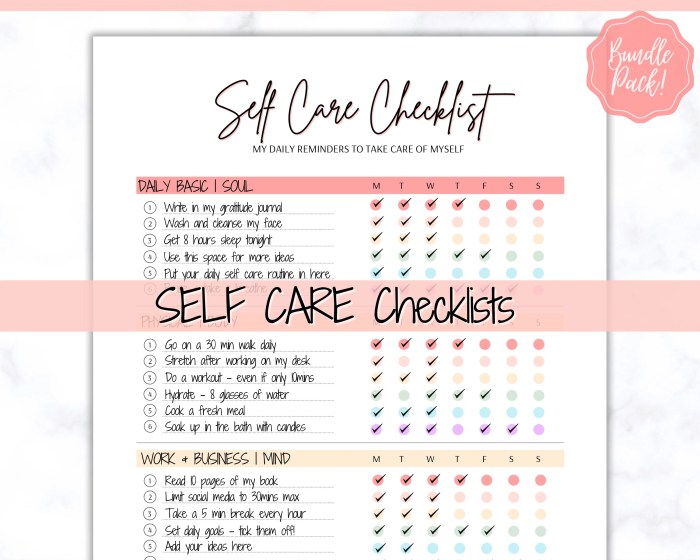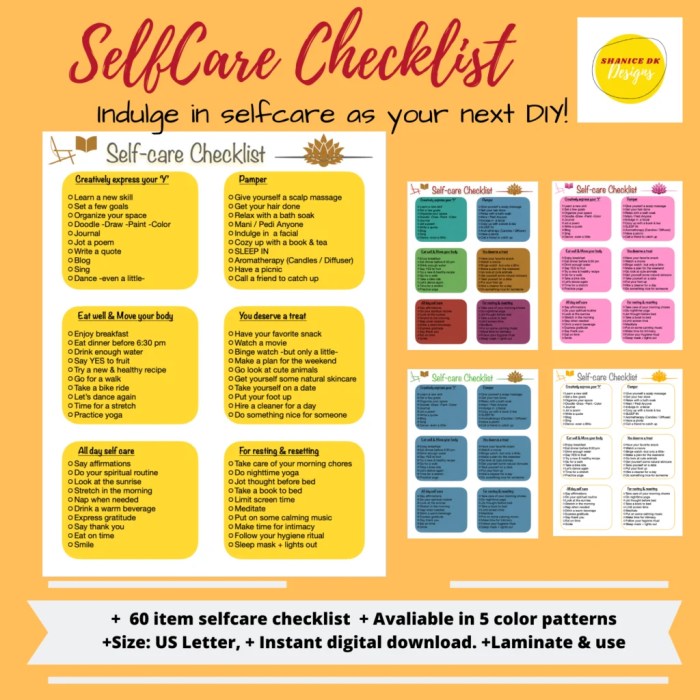Self-Care Routine Ideas are essential for maintaining a healthy balance in life, covering various aspects like physical, emotional, and social well-being. Let’s dive into some creative and effective ways to incorporate self-care into your daily routine.
Types of Self-Care Routines: Self-Care Routine Ideas
Self-care routines come in various forms, each catering to different aspects of our well-being. By incorporating a variety of self-care routines into our daily lives, we can achieve a more balanced and holistic approach to self-care.
Physical Self-Care
Physical self-care involves activities that promote physical health and well-being, such as exercise, proper nutrition, adequate rest, and regular medical check-ups. These routines help improve our overall physical health, boost energy levels, and enhance our immune system.
Emotional Self-Care
Emotional self-care focuses on nurturing our emotional well-being by practicing self-compassion, mindfulness, journaling, therapy, and engaging in activities that bring us joy and relaxation. These routines help us manage stress, build resilience, and improve our emotional intelligence.
Social Self-Care
Social self-care involves building and maintaining healthy relationships, setting boundaries, and spending quality time with loved ones. By nurturing our social connections, we can feel supported, connected, and valued, which contributes to our overall mental and emotional well-being.
Spiritual Self-Care
Spiritual self-care encompasses activities that nourish our soul and inner being, such as meditation, prayer, spending time in nature, or engaging in spiritual practices that align with our beliefs. These routines help us find meaning, purpose, and inner peace in our lives.
Incorporating a variety of self-care routines, including physical, emotional, social, and spiritual practices, can lead to overall well-being by addressing different aspects of our health and happiness. By creating a comprehensive self-care routine that encompasses these various types, we can achieve a more balanced and fulfilling life.
Morning Self-Care Routine
Starting your day off right with a morning self-care routine can set a positive tone for the rest of the day. It’s all about taking care of yourself first thing in the morning to ensure you’re ready to tackle whatever comes your way.
Typical Morning Self-Care Routine
- Start your day with some light stretching or yoga to wake up your body and get your blood flowing.
- Practice mindfulness or meditation to center yourself and set a positive intention for the day ahead.
- Journal about your thoughts, feelings, or goals to clear your mind and gain clarity on what you want to achieve.
- Enjoy a healthy breakfast to fuel your body and mind for the day ahead.
- Follow a skincare routine to care for your skin and boost your confidence.
Importance of Morning Self-Care Routine
Establishing a morning self-care routine is crucial for starting your day on the right foot. It helps you prioritize your well-being and mental health before diving into the hustle and bustle of daily life. By taking care of yourself first thing in the morning, you are better equipped to handle challenges and stress throughout the day.
Personalizing Your Morning Self-Care Routine
- Identify activities that make you feel good and incorporate them into your morning routine.
- Experiment with different self-care practices to find what works best for you.
- Adjust your routine based on your schedule, preferences, and needs to make it sustainable in the long run.
- Listen to your body and mind to determine what self-care activities will benefit you the most each morning.
Evening Self-Care Routine

For many people, the evening is a crucial time to wind down after a long day. Establishing a calming self-care routine can help relax the mind and body, leading to better sleep and overall well-being.
A Calming Evening Self-Care Routine, Self-Care Routine Ideas
- Reading a book: Engaging in a good book can help shift your focus away from the stressors of the day and promote relaxation before bedtime.
- Taking a bath: Soaking in a warm bath can soothe tired muscles and create a peaceful atmosphere conducive to unwinding.
- Practicing gratitude: Reflecting on the positive aspects of your day can foster feelings of contentment and gratitude, promoting a sense of well-being.
- Gentle stretching: Incorporating gentle stretches before bed can help release tension in the body and prepare you for a restful night’s sleep.
Significance of Winding Down with an Evening Self-Care Routine
By engaging in calming activities before bed, you signal to your body and mind that it’s time to relax, facilitating the transition to a restful night’s sleep. This routine can help reduce stress levels, improve mood, and enhance overall well-being.
Creating a Bedtime Ritual for Enhanced Well-Being
- Set a consistent bedtime: Establishing a regular sleep schedule can help regulate your body’s internal clock and improve the quality of your sleep.
- Avoid screens before bed: Limit exposure to electronic devices before bedtime to prevent disruptions to your circadian rhythm and promote relaxation.
- Practice deep breathing or meditation: Engaging in mindfulness practices can help calm the mind and reduce anxiety, setting the stage for a peaceful night’s sleep.
- Use aromatherapy: Incorporating calming scents like lavender or chamomile can create a soothing environment that promotes relaxation and sleep.
Self-Care Activities for Stress Relief

When it comes to managing stress, incorporating self-care activities into your routine can make a significant difference in your mental health and resilience. Finding effective ways to reduce stress, such as mindfulness practices, deep breathing exercises, or spending time in nature, can help you feel more balanced and at ease.
Mindfulness Practices
Engaging in mindfulness practices, such as meditation or yoga, can help you stay present in the moment and reduce feelings of stress and anxiety. Taking time to focus on your breath and quiet your mind can promote relaxation and overall well-being.
Deep Breathing Exercises
Practicing deep breathing exercises can help calm your nervous system and reduce the physical symptoms of stress, such as rapid heart rate or shallow breathing. By taking slow, deep breaths, you can signal to your body that it is safe to relax and unwind.
Spending Time in Nature
Connecting with nature has been shown to have a calming effect on the mind and body. Whether you take a walk in the park, sit by a river, or simply spend time outdoors, being in nature can help reduce stress levels and promote a sense of tranquility.
